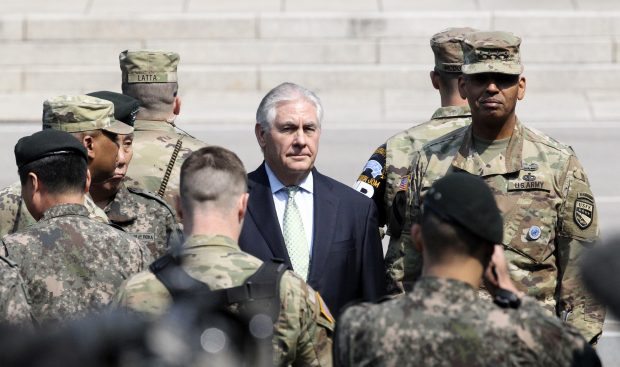Military action against North Korea ‘on the table’, says US

U.S. Secretary of State Rex Tillerson, center, visits with U.S. Gen. Vincent K. Brooks, commander of the United Nations Command, Combined Forces Command and United States Forces Korea, right, at the border village of Panmunjom, which has separated the two Koreas since the Korean War, South Korea, Friday, March 17, 2017. (AP Photo/Lee Jin-man, Pool)
U.S. Secretary of State Rex Tillerson declared an end to the Barack Obama administration’s policy of strategic patience in dealing with North Korea, vowing to explore all options including harsher sanctions and military action.
The U.S. top diplomat also stressed the importance of China’s role in forcing Pyongyang to abandon its nuclear and ballistic missile programs, urging Beijing to stop taking retaliatory actions against South Korea over the deployment of a Terminal High Altitude Area Defense (THAAD) battery here.
He made the comments during a joint news conference with his South Korean counterpart Yun Byung-se at the Ministry of Foreign Affairs in Seoul, before the two held the ministerial talks.
“The policy of strategic patience has ended,” Tillerson told reporters. “We are exploring a new range of diplomatic, security, economic measures. All options are on the table.”
He also said military action against nuclear-armed North Korea remains a possibility.
“Certainly, we do not want to, for things to get to military conflict,” he said, but added: “If they elevate the threat of their weapons program to a level that we believe requires action, then that option’s on the table.”
In the policy of strategic patience, the allies ruled out engaging North Korea and waited for positive changes in Pyongyang. The policy sometimes provoked the criticism that Obama did not come up with any new incentives to help curb the North’s missile and nuclear programs.
Tillerson indicated that further harsher economic sanctions against the North would follow, saying: “I don’t believe we have ever fully achieved the maximum level of action that can be taken under the U.N. Security Council resolution with full participation of all countries.”
He also made it clear that there would be no talks with the North unless it gives up its nuclear ambitions, noting that all the efforts for the past 20 years to bring the repressive state to the negotiating table ended in failure.
The U.S. official added his government will closely cooperate with the next South Korean president who will be elected May 9.
For his part, Yun said the two countries will stick to the principle of CVID _ complete, verifiable and irreversible dismantlement of North Korea’s nuclear capability. He added that more high-ranking discussions will follow to review options to achieve this goal.
The top diplomats of the two nations also agreed to ensure that the THAAD battery will be smoothly deployed here as soon as possible despite China’s objections. Beijing is strongly opposed to the system, claiming that the anti-missile battery seriously harms its security interests, despite Seoul and Washington’s assurance that THAAD is designed only to defend against North Korean missiles.
Tillerson said China’s ongoing retaliatory actions were regrettable, calling on the country to refrain from such actions and make efforts to better cope with North Korean threats that required measures such as the THAAD deployment.
Yun also said, “The deployment is a sovereign decision based on the right of self-defense,” adding that the system is not to be aimed at a third country.
The minister said the government will work with the U.S. and the international community to jointly respond to China’s improper pressure.
Before the talks, Tillerson paid a courtesy call on acting President and Prime Minister Hwang Kyo-ahn, who took over in December after then-President Park Geun-hye was impeached by the National Assembly for a corruption scandal.
Before this, the U.S. diplomat toured the Demilitarized Zone, a heavily armed military buffer that bisects the two Koreas.
He had lunch with troops at Camp Bonifas where a high-profile “axe murder” took place in 1976. At the time, two U.S. Army officers, who were pruning a large tree in the Joint Security Area, were killed by North Korean soldiers wielding axes.
Tillerson did not send any message or issue any statement there, but Seoul officials said his visit was construed as a tacit warning to the North. / The Korea Times
























































